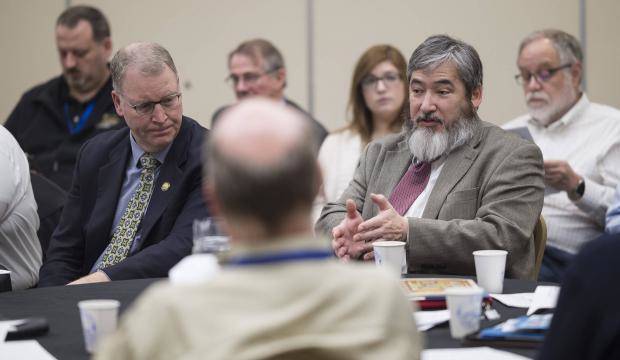When Rep. Sam Kito III walked out of Tuesday night’s House Rules Committee meeting in protest, he may have walked out of the Alaska House’s governing majority.
“It’s fair to say I will not be participating in caucus meetings from this time forward,” Kito told the Empire afterward.
While Kito has voted differently from his colleagues before, the breaking point appears to be Senate Bill 63, a proposal to prohibit smoking in most businesses and public areas.
Kito said he has been frustrated by the House Coalition Majority’s inability to unite.
One of the most noticeable examples of this has been the way House Rules Chairwoman Gabrielle LeDoux, R-Anchorage and a member of the coalition’s leadership, has held up SB 63 despite a tide of support from other members of the coalition.
Kito walked out of Tuesday night’s rules committee meeting after LeDoux said she would not take public testimony on SB 63.
“Despite — or beside — all the budget issues, for me this was one of the most important things we could have done to protect or benefit Alaskans,” he said Tuesday. “To me, it’s kind of a bellwether.”
The Empire contacted Speaker of the House Bryce Edgmon, D-Dillingham, after Kito’s statement Tuesday evening and asked the speaker how many members are in the caucus.
“Well, we have 21,” Edgmon said, appearing to confirm Kito’s departure from the 22-member caucus.
Edgmon said he is continuing to talk with Kito but declined additional comment.
If Kito’s departure from the caucus is final, it would leave members of the coalition House Majority with the bare minimum majority in the 40-person Alaska House of Representatives.
“Basically what it means is I’m not going to feel bound on procedural votes or budget requests,” Kito said. “Each decision will be each decision.”
Following the 2016 election, the coalition formed with 22 members: two independents, three Republicans and 17 Democrats, including Kito.
Asked Wednesday morning if anything had changed since the previous evening, Kito said, “Not for me. I don’t know that I would say it the same way, but the situation’s the same.”
He said he is still speaking with Edgmon, but he needs to see a change that creates more cohesive positions from the coalition’s leadership.
“If I’m to remain with the caucus, I’m looking for some clear direction from the Speaker to resolve some of those concerns about cohesiveness,” he said.
His break with the caucus comes after he said he was “totally frustrated” with the organization.
“I’ll still do my job and finish out my term, but the whole SB 63 thing was unfortunate and completely unnecessary,” he said.
Kito has already said he will not run for re-election this fall.
The implications of Kito’s decision to quit the caucus are broad. The coalition majority can no longer afford even a single member’s opposition to a piece of legislation if Kito and the 18-member Republican House Minority vote in opposition. (The majority struggled to muster adequate votes earlier this year because of illness, injury and scandal.)
That is extraordinarily significant, given that several members of the coalition majority have said they oppose a plan to balance the state’s multibillion-dollar deficit using only savings and money from the Alaska Permanent Fund. Advancing the budget in the House would thus require the support of the minority, but some minority support is already needed to reach the 30 votes necessary to spend from the Constitutional Budget Reserve.
More significant is the state capital construction and renovation budget, which will require only 21 votes. The House has not begun to consider that item. In addition, a flood of votes typically accompanies the end of the Legislative session as lawmakers attempt to garner support for bills at the last minute.
• Contact reporter James Brooks at jbrooks@juneauempire.com or 523-2258.

